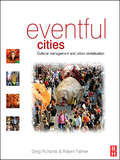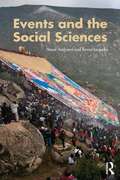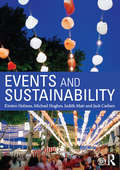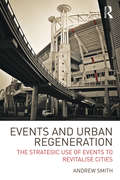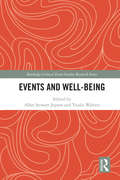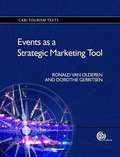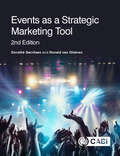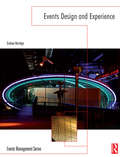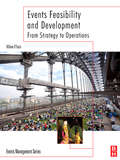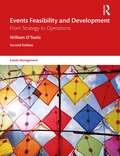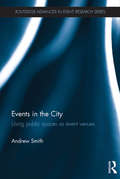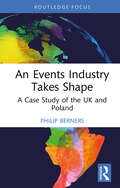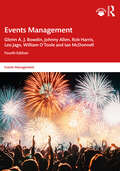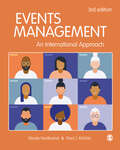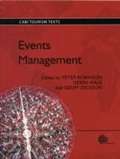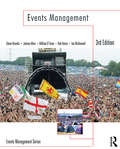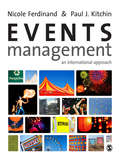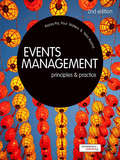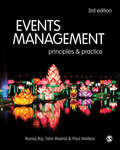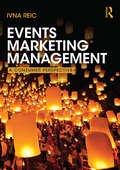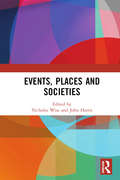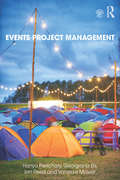- Table View
- List View
Eventful Cities
by Robert Palmer Greg RichardsProcesses of globalization, economic restructuring and urban redevelopment have placed events at the centre of strategies for change in cities. Events offer the potential to achieve economic, social, cultural and environmental outcomes within broader urban development strategies.This volume:* analyzes the process of cultural event development, management and marketing and links these processes to their wider cultural, social and economic context* provides a unique blend of practical and academic analysis, with a selection of major events and festivals in cities where ‘eventfulness’ has been an important element of development strategy* examines the reasons why different stakeholders should collaborate, as well as the reasons why cities succeed or fail to develop events and become eventful Eventful Cities evaluates theoretical perspectives and links theory and practice through case studies of cities and events across the world. Critical success factors are identified which can help to guide cities and regions to develop event strategies. This book is essential reading for any undergraduate or graduate student and all practitioners and policy-makers involved in event management, cultural management, arts administration, urban studies, cultural studies and tourism.
Events and The Social Sciences
by Hazel Andrews Teresa LeopoldAs the events management field expands as an area of study, there is a need to move beyond the business and marketing-driven approaches which dominate the literature towards a more advanced conceptual analysis and understanding of events from a socio-cultural context. This book addresses this need by examining intersections between the social sciences and the emerging field of events management. It applies and specifically contextualises social science theories within the discourse of events to provide a greater understanding of the significance of events in contemporary society. It first outlines the value of approaching the study of events from a social science perspective, and then moves on to an in-depth exploration of relevant theories exploring topics such as identity, culture, consumerism, representation and place. It concludes with a summary of each chapter and a discussion of ways in which events can be further explored through the lens of the social sciences. The book features international case studies based on a variety of event types ranging from sports events, religious and cultural events and community events, which are used throughout to address contemporary issues and show theory in practice. 'Think Points' are integrated into each chapter to encourage the reader to reflect on theories, and each chapter concludes with summary points, further reading and links to useful websites to consolidate learning and further knowledge. This book will provide upper-level students, academics and researchers interested in events, as well as those from related social science disciplines, with a robust socio-cultural conceptual analysis of the subject and a greater understanding of the significance of events in contemporary society.
Events and Sustainability
by Michael Hughes Jack Carlsen Kirsten Holmes Judith MairIncreasing concerns over climate and environmental change, the global economic and financial crisis and impacts on host communities, audiences, participants and destinations has reinforced the need for more sustainable approaches to events. Sustainability now features as part of the bid process for many mega-events, such as the Olympic Games, as well as significant regional and local events, where the event organisers are required by funding bodies and governments to generate broader outcomes for the locality. This book is the first to offer students a comprehensive introduction to the full range of issues and topics relevant to event sustainability including impacts, operating and policy environments, stimulating urban regeneration and creating lasting legacies, as well as practical knowledge on how to achieve a sustainable event. Taking a holistic approach drawing on multidisciplinary theory it offers insight into the economic, socio-cultural and environmental impacts and how these can be adapted or mitigated. Theory and practice are linked through integrated case studies based on a wide range of event types from mega events to community festivals to show impacts, best practice and how better sustainable practice can be achieved in the future. Learning objectives, discussion questions and further reading suggestions are included to aid understanding and further knowledge; additional resources for lecturers and students including power point slides, video and web links are available online. Events and Sustainability is essential reading for all events management students and future managers.
Events and the Environment
by Robert CaseMany of our planet’s support systems are in crisis. Climate change, resource shortages and environmental pollution threaten our economy and lifestyles. Society as a whole needs to adopt policies that can meet these challenges. The ever expanding event industry is no exception. Anyone involved in organising and managing events needs to understand the complex relationship between events and the environment so that they can implement sustainable management practices. This is the first book to provide a thorough exploration of the multi-dimensional relationships between events and the environment. It achieves this by not only critically evaluating the positive and negative impacts on the environment but also by reviewing the ways the events industry uses the environment as a resource and how the environment helps to shape events. It traces the evolution of the concepts of sustainability and sustainable development and the implementation of environmental legislation. It offers insights into how sustainable measurement practices can be incorporated into the planning, management and monitoring of events and concludes by reflecting on some of the future environmental issues that still need to be resolved within the industry. It illustrates these ideas with a wide range of case studies at a variety of scales and geographical locations on all the earth’s continents. To encourage reflection on the principal themes and promote critical thinking, there are discussion questions and links to further reading in each chapter. This book is essential reading for students of Events Management.
Events and Urban Regeneration: The Strategic Use of Events to Revitalise Cities
by Andrew SmithIn recent years, major sporting and cultural events such as the Olympic Games have emerged as significant elements of public policy, particularly in efforts to achieve urban regeneration. As well as opportunities arising from new venues, these events are viewed as a way of stimulating investment, gaining civic engagement and publicizing progress to assist the urban regeneration process more generally. However, the pursuit of regeneration involving events is a practice that is poorly understood, controversial and risky. Events and Urban Regeneration is the first book dedicated to the use of events in regeneration. It explores the relationship between events and regeneration by analyzing a range of cities and a range of sporting and cultural events projects. It considers various theoretical perspectives to provide insight into why major events are important to contemporary cites. It examines the different ways that events can assist regeneration, as well as problems and issues associated with this unconventional form of public policy. It identifies key issues faced by those tasked with using events to assist regeneration and suggests how practices could be improved in the future. The book adopts a multi-disciplinary perspective, drawing together ideas from the geography, urban planning and tourism literatures, as well as from the emerging events and regeneration fields. It illustrates arguments with a range of international case studies placed within and at the end of chapters to show positive outcomes that have been achieved and examples of high profile failures. This timely book is essential reading for students and practitioners who are interested in events, urban planning, urban geography and tourism.
Events and Well-being (Routledge Critical Event Studies Research Series.)
by Allan Stewart Jepson; Trudie WaltersThis book is the first to take an in-depth examination of events and well-being, adopting a much-needed critical approach to the study of events. It uses empirical case studies to help us better understand how events foster positive well-being or counter negative well-being for event organisers, participants, spectators, volunteers and even non-attending local residents. While researchers have long understood socialisation as the major motivation to attend contemporary festivals and events, it is only just being acknowledged that well-being is also a key motivator. Those researching in the field of event studies are yet to clearly articulate "the how, why, where, and impacts of socialisation." This multidisciplinary book draws together empirical research across a range of event types and sizes, from music festivals to mega sports events, to provide a nuanced understanding of their contribution to the well-being of individuals and communities. Case studies are drawn from around the world and apply a diverse range of theoretical lenses to the conceptualisation of well-being as it applies to events and methodologies used to achieve research aims and objectives. This significant volume will be valuable reading for students and academics in the fields of sport studies, critical event studies, queer studies, cultural studies, tourism, music, sociology and end-of-life studies.
Events as a Strategic Marketing Tool
by Dorothe Gerritsen Ronald Van OlderenExperiences, encounters and events have come to play an ever-growing role in marketing as their impact is more fully understood. As a profession, however, event marketing is still a relatively new field, with most available literature covering practical project management rather than the strategy behind including events in a marketing campaign. Addressing this gap, Events as a Strategic Marketing Tool reviews the way organizations utilize events to connect with their visitors. It covers the development of the experience economy, the step from strategy to concept, event design and touchpoints. Written in an accessible style, it also considers the areas of marketing within which experiences play a role, such as branding, relationship marketing and city marketing. Concluding with a chapter on effect measurement and evaluation, Events as a Strategic Marketing Tool provides an engaging resource for both students and professionals interested in leisure, tourism and events. Including a wealth of internationally relevant examples, it gives a thorough insight into the way events can help reach strategic marketing goals.
Events as a Strategic Marketing Tool (Tourism Studies)
by Dorothé Gerritsen Ronald van OlderenEvents have come to play an ever-growing role in marketing; by connecting products and services with experiences and vice versa, producers can create important added value. Events as a Strategic Marketing Tool, 2nd edition describes how events can be used as a strategic tool in marketing practices. Fully updated and with new case studies throughout, this second edition reviews the way organizations use events to connect with their visitors. It covers the development of the experience economy, the steps from strategy to concept, event design and touchpoints. It also considers the areas of marketing within which experiences play a role, such as branding, relationship marketing and city marketing. Concluding with a chapter on effect measurement and evaluation, and including a wealth of internationally relevant examples, the book gives a thorough insight into the way events can help reach strategic marketing goals. With coverage of a wide range of marketing areas, the book also includes content on cutting-edge topics such as neuromarketing, providing students with a comprehensive introduction to using events as part of the marketing mix. Contains numerous international examples that showcase the variety of ways that events can be used A wealth of images illustrate the theory, helping students to visualize concepts and improve understanding. This new edition provides an engaging resource for both students and professionals interested in leisure, tourism and events.
Events Design and Experience (Events Management)
by Graham BerridgeFor the first time Events Design and Experience draws together the relationship between event design and the experience of consumers and participants. It explores and analyses the event experience of the individual and how this can be ‘controlled’ by design.By drawing upon ongoing research conducted over several years into the experiences of groups and individuals who attend events this text will ask questions such as: What was the rationale behind a particular event being designed in a certain way? What was the actual experience of consumers? How was the event materially delivered and did the experience created provide a satisfactory outcome? How can experiences be understood (via semiotics) especially the physical elements of an event?Structured in four sections, Events Design and Experience discusses:* What are events? An overall view of the industry, its definitions and market demand. It also covers an analysis of previous literature, and draws upon real life events such as Wembley plc, Leapfrog Corporate events and the British Cycling federation* What is an event experience? An explanation of the nature and stages of experience, and the emergence of the experience industry itself. Cases such as the Proms, London Fashion week ands the Nike Fun run are used to illustrate.* Designing Experiences. Considers how design itself can impact upon the experience, in some cases fundamentally changing the nature of experience. It asks the question of how experiences are designed and what do they signify to the customer once complete.* Analysing Event Experiences. Considers how experiences can be analysed and evaluated looking at the artificiality of the event and how this reflects in the experience of consumers. Also includes a review of the psychological processes of perception and interpretation and how meaning and experience can be analysed, and how we may begin to unravel the meanings attributed to certain events. With international case studies throughout, Events Design and Experience has a coherent user-friendly structure including chapter summaries, review exercises and topics for discussion to consolidate understanding.
Events Feasibility and Development (Events Management)
by William O'TooleEvents Feasibility and Development: From Strategy to Operations answers two fundamental questions faced by all events planners and organizers: how do I justify this event to the client? and why are we spending money on this event?. With a user-friendly learning structure containing bullet points, questions and exercises and international case studies (Australian Taxation Office, Saudi Arabian events returns, Fuji-Xerox events), Events Feasibility and Development: From Strategy to Operations looks at issues such as: the process of creating a feasibility study events forecasting models and cost/benefit analysis types of events (exhibitions, sports, festivals) and their benefits and returns project management tools for measuring return on investment. Companion website: www.eventsfd.com -- contains videos, colour photos and a list of related resources.
Events Feasibility and Development: From Strategy to Operations (Events Management)
by William O'TooleEvents Feasibility and Development: From Strategy to Operations 2nd Edition outlines the best practice in event development and the global events sector. Tools and techniques from the first edition have been refined and expanded through their use in over 20 countries, including the USA, France, UAE, Malaysia and South Africa. These include strategy development and implementation, asset management, portfolio management, return on investment, management process mapping and the feasibility study. Fascinating current examples illustrate these professional management techniques. The second edition elaborates on the events sector maturity model as a measurement tool for cities, regions and countries. This has been tried and successfully tested in developing economies and assisted in the rapid development and sustainability of events in Dubai and many other destinations. Each chapter contains exhibits, questions, bullet points and clear explanations of the tools and techniques. Brand new material includes: A full explanation of the maturity model including post-pandemic solutions New case studies and exhibits A new section on teaching and training in event management The chapters are fully supported by further current case studies and examples on the publisher’s and the author’s website. Online material also includes 11 lesson plans for a semester course, containing assessment items, learning objectives and teaching tips for each topic, and event photos and author videos explaining the topics. This will be essential reading for all students of Event Management.
Events in the City: Using public spaces as event venues (Routledge Advances in Event Research Series)
by Andrew SmithCities are staging more events than ever. Within this macro-trend, there is another less acknowledged trend: more events are being staged in public spaces. Some events have always been staged in parks, streets and squares, but in recent years organisers have tried to bring events out of traditional venues and into prominent urban spaces. This is favoured by organisers seeking more memorable and more spectacular events, but also by authorities who want to animate urban space and make it more visible. This book will explore, account for and illustrate these trends. Most importantly, it will outline their implications. Whilst most accounts of events assume they play a positive role in our cities, the use of public spaces for events is controversial. Events can denigrate as well as animate public space. They can be seen as part of the commercialisation, privatisation and (over)regulation of public space noted by commentators in recent years. This innovative text offers significant insight into some of the key reasons why cities are staging more events in public spaces (the need to generate funds and market cities), what problems this causes (exclusion, commercialisation, disruption) and how effective management and regulation can help to secure more optimal outcomes for citizens. This topical and timely volume is valuable reading for higher level students, researchers and academics from Events, Urban Studies and Development studies.
An Events Industry Takes Shape: A Case Study of the UK and Poland
by Philip BernersThis timely book critically evaluates the factors which shape an events industry as it develops, with the aim of helping to narrow the disparate behaviours and practices of organisers within the global marketplace of international events.Stemming from an innovative qualitative research project, which included interviews with senior events organisers at landmark venues in both the UK and Poland, this volume provides an insight into both the emerging events industry in Poland and the developed events industry in the UK, highlighting cross-cultural risk and safety gaps that may impact organisers, clients, attendees, suppliers, and workers. The book highlights the importance of a unanimous global approach to events organisation, the creation of a professional community of practice, and ethos of self-learning within the events industry and the need for an international professional association for organisers involved with providing international events. The book explores the three themes of 'Event Culture', 'Tourism and Events', and 'Risk Awareness at Events', thus focusing on long-term factors of events industries.International in scope, this book will appeal to students on courses such as managing events, planning events, project management, and hospitality and tourism studies, as well as events organisers in locations where events is an emerging industry.
Events Management (Events Management)
by Glenn A. Bowdin Johnny Allen Rob Harris Leo Jago William O'Toole Ian McDonnellA must-have introductory text of unrivalled coverage and depth focusing on events planning and management, the fourth edition of Events Management provides a complete A to Z of the principles and practices of planning, managing and staging events. The book offers a systematic guide to organising successful events, examining areas such as event design, logistics, marketing, human resource management, financial planning, risk management, impacts, evaluation and reporting. The fourth edition has been fully updated and revised to include content covering technology, including virtual and hybrid events, concepts such as social capital, soft power and events, social inclusion, equality, accessibility and diversity, and the latest industry reports, research and legal frameworks. The book is logically structured and features new case studies, showing real-life applications and highlighting issues with planning events of all types and scales in a range of geographical locations. This book has been dubbed ‘the events management bible’ and fosters an interactive learning experience amongst scholars of events management, tourism and hospitality.
Events Management: An International Approach
by Nicole Ferdinand Paul J. KitchinTaking an explicit international approach to the subject, Events Management combines theory and practice to address the challenges and opportunities of working in a global world to help prepare students for the realities of the events management sector. Written by a high profile international team of editors and contributors, the text features cases spanning Europe, Africa, Asia, Australia and North America, and covers key topics and issues such as fundraising, sponsorship, globalization and sustainability. It also aims to bolster student employability through the inclusion of features such as practical asides and case studies to give students a window into the real life of a practitioner. Brand new to the third edition: - An in-depth examination of the implications of Covid-19 for international events, including sponsorship arrangements, risk management and future job prospects for events management graduates - Two brand new chapters covering developments in digital marketing and accessible events management - Case studies featuring India, Australia, Peru, Europe, UK and USA and covering events such as music festivals, Holi, Mardi Gras as well as mega events such as the Olympics - Updated theory about the critical global issues affecting events and the main drivers of change in the industry - A companion website featuring links to interactive learning resources, an Instructors manual for lecturers, events-related videos for fun additional educational viewing, and author-selected SAGE journal articles for advanced learning. Suitable for courses in Events Management and International Events Management.
Events Management: An International Approach
by Nicole Ferdinand Paul J. KitchinTaking an explicit international approach to the subject, Events Management combines theory and practice to address the challenges and opportunities of working in a global world to help prepare students for the realities of the events management sector. Written by a high profile international team of editors and contributors, the text features cases spanning Europe, Africa, Asia, Australia and North America, and covers key topics and issues such as fundraising, sponsorship, globalization and sustainability. It also aims to bolster student employability through the inclusion of features such as practical asides and case studies to give students a window into the real life of a practitioner. Brand new to the third edition: - An in-depth examination of the implications of Covid-19 for international events, including sponsorship arrangements, risk management and future job prospects for events management graduates - Two brand new chapters covering developments in digital marketing and accessible events management - Case studies featuring India, Australia, Peru, Europe, UK and USA and covering events such as music festivals, Holi, Mardi Gras as well as mega events such as the Olympics - Updated theory about the critical global issues affecting events and the main drivers of change in the industry - A companion website featuring links to interactive learning resources, an Instructors manual for lecturers, events-related videos for fun additional educational viewing, and author-selected SAGE journal articles for advanced learning. Suitable for courses in Events Management and International Events Management.
Events Management
by Steve Gelder Caroline Wiscombe Ade Oriade Sine Heitmann Peter Robinson Andrew Ridal Crispin Dale Christine Roberts Ghislaine Povey Geoff Dickson Debra WaleEvent management studies are fast growing in popularity, covering a diverse range of activities such as music and film festivals, concerts, sporting events and conferences. This textbook gives a broad and practical coverage of the major themes in events. Outlining both the historical developments and current state of the industry, whilst also taking into account wider political and cultural issues, the book covers the different elements of planning, project management, health and safety, funding, operations, human resources, marketing and logistics that are vital for successful management. Critical issues such as impacts, sustainability and legacy of events are also discussed. Supported by international case studies and review questions, Events Management provides a current and up-to-date view of the industry in this field.
Events Management (Events Management)
by Rob Harris Ian McDonnell William O'Toole Glenn Bowdin Johnny AllenEvents Management is the must-have introductory text providing a complete A-Z of the principles and practices of planning, managing and staging events. The book: introduces the concepts of event planning and management presents the study of events management within an academic environment discusses the key components for staging an event, covering the whole process from creation to evaluation examines the events industry within its broader business context, covering impacts and event tourism provides an effective guide for producers of events contains learning objectives and review questions to consolidate learning Each chapter features a real-life case study to illustrate key concepts and place theory in a practical context, as well as preparing students to tackle any challenges they may face in managing events. Examples include the Beijing Olympic Games, Google Zeitgeist Conference, International Confex, Edinburgh International Festival, Ideal Home Show and Glastonbury Festival. Carefully constructed to maximise learning, the text provides the reader with: a systematic guide to organizing successful events, examining areas such as staging, logistics, marketing, human resource management, control and budgeting, risk management, impacts, evaluation and reporting fully revised and updated content including new chapters on sustainable development and events, perspectives on events, and expanded content on marketing, legal issues, risk and health and safety management a companion website: www.elsevierdirect.com/9781856178181 with additional materials and links to websites and other resources for both students and lecturers
Events Management
by Mr Paul James Kitchin Ms Nicole FerdinandWritten by a team of twenty-five high profile, international authors, this exciting new text successfully combines theory and practice, making it a must-have for all students of Events Management.<P><P> Events Management: An International Approach provides comprehensive coverage of all the most common types of events, preparing students for a future career in Events Management. Covering key issues such as fundraising, sponsorship, globalization and sustainability, this text addresses the challenges and examines the realities of events management in an international context. A wide range of case studies and examples look at sporting, music, catering and fundraising events across Europe, Africa, Asia, Australia and North America.<P> Key features include:<P> * An international approach, drawing on a wide range of cases from around the world<P> * Extensive pedagogical features such as Diary of an Event Manager and Exercises in Critical Thinking<P> * A companion website offering a full Instructor's Manual, PowerPoint slides, additional case studies and links to SAGE journal articles<P> This book is essential reading for all undergraduate and postgraduate students studying Events Management. <P> Visit the Companion Website at www.sagepub.co.uk/ferdinand <P> Nicole Ferdinand is Senior Lecturer in Events Management at the London Metropolitan Business School.<P> Paul J. Kitchin is Lecturer in Sports Management at the University of Ulster.
Events Management: Principles and Practice
by Razaq Raj Paul Walters Mr Tahir RashidThe new edition of this popular accessible text gives students a thorough and contemporary grounding in both the fundamentals and strategic responsibilities of successful event management. Purposefully broad in scope, the text combines theory with practical knowledge and terminology, ensuring readers develop a flexible and commercially-acute skill set. <P><P> Topics covered range from law, marketing and finance to introductory guides to sound, lighting and multimedia equipment, providing students with the practical knowledge they need for a career in Events Management. Theory is brought to life in a range of case studies and examples throughout the text. <P> As well as updated examples and legislation, this edition introduces new chapters on:<P> * Event entrepreneurship<P> * Project management and financing<P> * New Multimedia technology for events organisers<P> * Sustainable festivals and events<P> * Long term legacy and impacts<P> * The future of the industry<P> An accompanying Companion Website provides students with discussion questions and video links. The website also provides an Instructor's Manual and PowerPoint slides for lecturers. <P> This text is an ideal resource for undergraduate students who are studying Events Management for the first time. <P> Visit the Companion Website at www.sagepub.co.uk/raj
Events Management: Principles and Practice
by Razaq Raj Paul Walters Tahir RashidEvents Management provides an introductory overview of the fundamentals in managing events from conception to delivery, highlighting both the theoretical and operational aspects, to prepare students for a career in events management and hospitality. Now in its Third Edition, the authors have included new chapters on Crowd Control and Crowd Dynamic; Expos, Conferences and Conventions; Brand Co-creation and Social Media, and have added new content on contemporary trends like the environmental and social impact of large scale events such as the Olympics. International case studies covering all manner of events are used throughout and include: · The impact of the London 2012 and Rio 2016 Olympic Games · Van Gogh Augmented Reality in Nuenen · Sands EXPO and Convention Center, Las Vegas · Glastonbury Music Festival · Lame Horse Night Club, Russia · The Leeds Caribbean Festival PowerPoint slides and an Instructor Manual can be found online. Suitable for Events Management students at Undergraduate and Postgraduate level.
Events Management: Principles and Practice
by Razaq Raj Paul Walters Tahir RashidEvents Management provides an introductory overview of the fundamentals in managing events from conception to delivery, highlighting both the theoretical and operational aspects, to prepare students for a career in events management and hospitality. Now in its Third Edition, the authors have included new chapters on Crowd Control and Crowd Dynamic; Expos, Conferences and Conventions; Brand Co-creation and Social Media, and have added new content on contemporary trends like the environmental and social impact of large scale events such as the Olympics. International case studies covering all manner of events are used throughout and include: · The impact of the London 2012 and Rio 2016 Olympic Games · Van Gogh Augmented Reality in Nuenen · Sands EXPO and Convention Center, Las Vegas · Glastonbury Music Festival · Lame Horse Night Club, Russia · The Leeds Caribbean Festival PowerPoint slides and an Instructor Manual can be found online. Suitable for Events Management students at Undergraduate and Postgraduate level.
Events Marketing Management: A consumer perspective
by Ivna ReicThis textbook provides students with an essential introduction to the theoretical underpinnings and practicalities of managing the marketing of events. In order to market events effectively, it is vital to consider marketing of events from the organiser’s perspective and to link it to that of the consumers attending events. As such, this is the first book on the topic which reflects the unique characteristics of marketing in the Events industry by exploring both sides of the marketing coin – the supply and the demand – in the specific context of events. The book takes the reader from core marketing mix principles to exploring the event marketing landscape to consumer experience and involvement with event marketing and finally strategies and tactics employed to manage the marketing activities related to events. The use of technology, importance of sponsorship and PR are also considered. International case studies are integrated throughout to show practical realities of marketing and managing events and a range of useful learning aids are incorporated to aid navigation throughout the book, spur critical thinking and further students’ knowledge. This accessible and comprehensive account of Events Marketing and Management is essential reading for all students and future managers.
Events, Places and Societies
by Nicholas Wise John HarrisEvents can be synonymous with a particular place, helping shape and promote a location. Given the rise of the global events industry, this book uncovers how events impact upon places and societies, looking at a range of different events and geographical scales. Geographers are concerned with how notions of space and place impact people, communities and identity, and events have played a central role in how places are perceived, consumed and even contested. This book will discuss international event cases to frame knowledge around the increased demands, pressures and complexities that globalisation, transnationalism, regeneration and competitiveness has put on events, places and societies. Integrating discussions of theory and practice, this book will explore the range of conceptual perspectives linked to how geographers and sociologists understand events and the role events play in contemporary times. This involves recognizing histories and planning strategies, the purpose of bidding for an event or the local meanings that have emerged and changed in the place. This helps us analyse how events have the potential to redefine place identities. This international edited collection will appeal to academics across disciplines such as geography, planning and sociology, as well as students on events management and events studies courses.
Events Project Management
by Hanya Pielichaty Georgiana Els Ian Reed Vanessa MawerThis book provides events management students with an accessible and essential introduction to project management. Written by both academics and industry experts, Events Project Management offers a unique blend of theory and practice to encourage and contextualise project management requirements within events settings. Key questions include: What is project management? How does it connect to events management? What is effective project management within the events sector? How does academic theory connect to practice? The book is coherently structured into 12 chapters covering crucial event management topics such as stakeholders, supply chain management, project management tools and techniques, and financial and legal issues. Guides, templates, case study examples, industry tips and activity tasks are integrated in the text and online to show practice and aid knowledge. Written in an engaging style, this text offers the reader a thorough understanding of how to successfully project manage an event from the creative idea to the concrete product. It is essential reading for all events management students.
